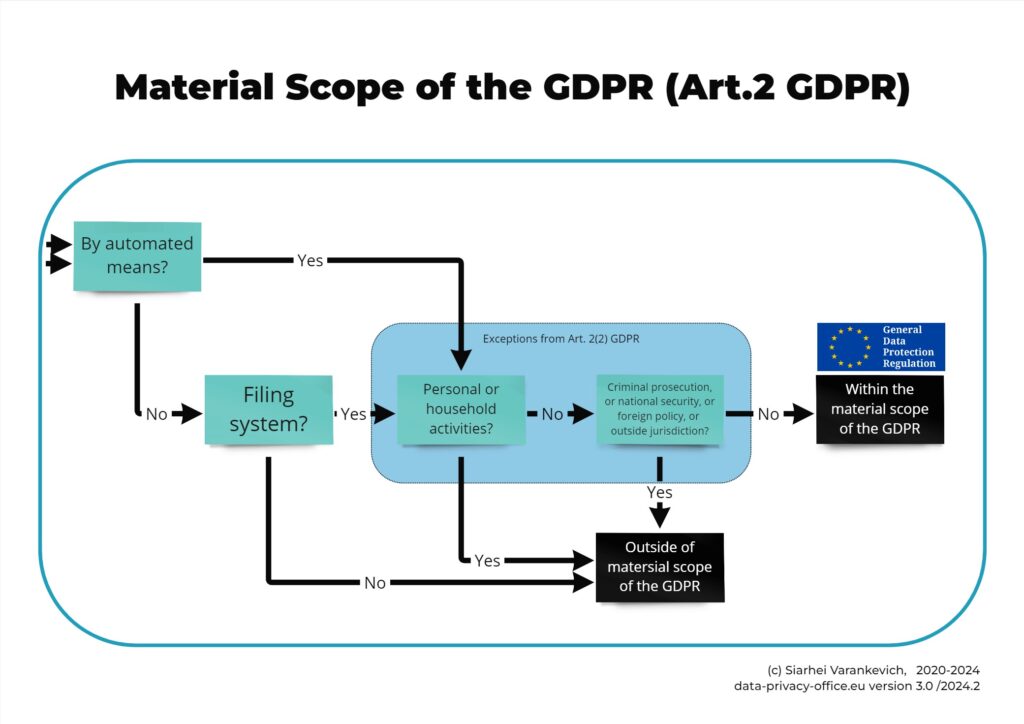(14) 본 규정이 정하는 개인정보 보호는 국적이나 거주지에 상관없이 개인정보 처리와 관련된 개인에게 적용되어야 한다. 본 규정은 법인의 명칭과 형태 및 법인의 연락처 등 법인, 특히 법인으로 설립된 사업체와 관련된 개인정보의 처리는 다루지 않는다.
(14) The protection afforded by this Regulation should apply to natural persons, whatever their nationality or place of residence, in relation to the processing of their personal data. This Regulation does not cover the processing of personal data which concerns legal persons and in particular undertakings established as legal persons, including the name and the form of the legal person and the contact details of the legal person.
(15) 법의 적용 우회(circumvention)로 인한 심각한 위험을 방지하기 위해서, 개인보호는 기술적으로 중립적이어야 하고, 사용되는 기법에 의존해서는 안 된다. 개인정보가 파일링시스템에 포함되거나 포함될 예정이라면 자동화 방식에 의한 개인정보 처리 및 수동 처리에 대해서도 개인의 보호가 이루어져야 한다. 특정 기준에 따라 구성되지 않은 개인정보의 파일 또는 파일세트, 그리고 그 커버 페이지는 본 규정의 적용범위에 해당하지 않는다.
(15) In order to prevent creating a serious risk of circumvention, the protection of natural persons should be technologically neutral and should not depend on the techniques used. The protection of natural persons should apply to the processing of personal data by automated means, as well as to manual processing, if the personal data are contained or are intended to be contained in a filing system. Files or sets of files, as well as their cover pages, which are not structured according to specific criteria should not fall within the scope of this Regulation.
(16) 본 규정은 기본권 및 자유보장에 관한 사안, 그리고 국가안보와 관련한 활동과 같은 유럽연합 법률 영역 밖의 활동과 연관된 개인정보의 자유로운 이동에는 적용되지 않는다. 본 규정은 회원국이 유럽연합 공동의 외교 및 안보정책과 관련한 활동 시에 이루어지는 개인정보 처리에는 적용되지 않는다.
(16) This Regulation does not apply to issues of protection of fundamental rights and freedoms or the free flow of personal data related to activities which fall outside the scope of Union law, such as activities concerning national security. This Regulation does not apply to the processing of personal data by the Member States when carrying out activities in relation to the common foreign and security policy of the Union.
(17) 유럽 의회와 유럽 각료이사회의 규정(EC) No 45/2001은 유럽연합의 기관, 기구, 사무소 및 에이전시가 처리하는 개인정보에 적용된다 [6]. 이러한 개인정보처리에 적용 가능한 규정(EC) No 45/2001 및 기타 유럽연합 법률은 본 규정의 원칙과 규정에 맞게 조정되어야 하며 본 규정에 따라 적용되어야 한다. 유럽연합에서 더 강력하고 일관된 개인정보보호 프레임워크를 제공하기 위해서는 본 규정을 채택한 후, 본 규정과 동시에 적용시키기 위해 규정(EC) No 45/2001을 필요한 만큼 개정하여야 한다.
(17) Regulation (EC) No 45/2001 of the European Parliament and of the Council [6] applies to the processing of personal data by the Union institutions, bodies, offices and agencies. Regulation (EC) No 45/2001 and other Union legal acts applicable to such processing of personal data should be adapted to the principles and rules established in this Regulation and applied in the light of this Regulation. In order to provide a strong and coherent data protection framework in the Union, the necessary adaptations of Regulation (EC) No 45/2001 should follow after the adoption of this Regulation, in order to allow application at the same time as this Regulation.
[6] Regulation (EC) No 45/2001 of the European Parliament and of the Council of 18 December 2000 on the protection of individuals with regard to the processing of personal data by the Community institutions and bodies and on the free movement of such data (OJ L 8, 12.1.2001, p. 1). https://eur-lex.europa.eu/legal-content/EN/AUTO/?uri=OJ:L:2001:008:TOC
[6] Regulation (EC) No 45/2001 of the European Parliament and of the Council of 18 December 2000 on the protection of individuals with regard to the processing of personal data by the Community institutions and bodies and on the free movement of such data (OJ L 8, 12.1.2001, p. 1). https://eur-lex.europa.eu/legal-content/EN/AUTO/?uri=OJ:L:2001:008:TOC
(18) 본 규정은 순수한 개인 또는 가정 활동 중에 발생하는 것으로서 직업적 또는 상업적 활동과는 연관이 없는 개인에 의한 개인정보의 처리에는 적용되지 않는다. 개인 또는 가정 활동에는 서신왕래와 주소지 보유, 또는 소셜 네트워크 활동 및 이러한 활동의 맥락에서 이루어지는 온라인 활동 등이 포함될 수 있다. 그러나 본 규정은 그 같은 개인 또는 가정활동을 위한 개인정보의 처리 수단을 제공하는 컨트롤러나 프로세서에게는 적용된다.
(18) This Regulation does not apply to the processing of personal data by a natural person in the course of a purely personal or household activity and thus with no connection to a professional or commercial activity. Personal or household activities could include correspondence and the holding of addresses, or social networking and online activity undertaken within the context of such activities. However, this Regulation applies to controllers or processors which provide the means for processing personal data for such personal or household activities.
(19) 공공안보에 대한 위협으로부터 보호와 예방, 개인정보의 자유로운 이전 등 범죄예방, 수사, 적발 또는 기소, 또는 형벌 집행의 목적으로 관할 당국이 개인정보를 처리하는 것과 관련한 개인의 보호는 유럽연합 특별법에서 다룬다. 따라서 본 규정은 상기 목적을 위한 처리 활동에는 적용되지 않는다. 그러나 본 규정에 따라 공공기관이 처리하는 개인정보는 상기 목적으로 사용될 때 좀 더 특정한 유럽연합 법률, 즉 유럽의회 및 유럽 각료이사회 지침(EU) 2016/680의 규제를 받는다 [7]. 회원국은 지침 (EU) 2016/680.이 지칭하는 관할 당국에 공공안보 위협으로부터의 보호와 예방, 개인정보의 자유로운 이전 등 반드시 범죄 예방, 수사, 적발 또는 기소, 또는 형벌의 집행을 목적으로 할 필요가 없는 업무를 맡길 수 있고 그러한 기타 목적의 개인정보의 처리는 유럽연합 법률의 적용범위에 해당하는 한 본 규정의 범위에 해당한다.
(19) The protection of natural persons with regard to the processing of personal data by competent authorities for the purposes of the prevention, investigation, detection or prosecution of criminal offences or the execution of criminal penalties, including the safeguarding against and the prevention of threats to public security and the free movement of such data, is the subject of a specific Union legal act. This Regulation should not, therefore, apply to processing activities for those purposes. However, personal data processed by public authorities under this Regulation should, when used for those purposes, be governed by a more specific Union legal act, namely Directive (EU) 2016/680 of the European Parliament and of the Council [7]. Member States may entrust competent authorities within the meaning of Directive (EU) 2016/680 with tasks which are not necessarily carried out for the purposes of the prevention, investigation, detection or prosecution of criminal offences or the execution of criminal penalties, including the safeguarding against and prevention of threats to public security, so that the processing of personal data for those other purposes, in so far as it is within the scope of Union law, falls within the scope of this Regulation.
본 규정의 범위에 해당하는 목적으로 관할 당국이 개인정보를 처리하는 것과 관련하여, 회원국은 본 규정의 규칙 적용에 맞추기 위하여 좀 더 특정한 조문을 유지하거나 신설할 수 있어야 한다. 그러한 조문을 통해 각 회원국의 헌법적, 조직적, 행정적 구조를 참작하여 관할 당국이 상기의 기타 목적으로 개인정보를 처리하는 것에 대한 특정 요건을 더 정확히 결정할 수 있다. 민간기관의 개인정보 처리가 본 규정의 범위에 해당할 때, 본 규정은 회원국이 특정 조건에 따라 법률로써 특정의 의무 및 권리를 제한할 수 있음을 규정해야 한다. 단, 그 같은 제한이 공공안보에 대한 위협으로부터의 보호와 예방, 개인정보의 자유로운 이전 등 범죄 예방, 수사, 적발 또는 기소, 또는 형벌의 집행을 포함한 특정의 중요한 이익을 보호하기 위해 민주사회에서 필요하고 적절한 조치가 될 때 그러하다. 예를 들어, 자금세탁 방지 또는 법의학연구 활동의 체계에서 관련이 있다.
With regard to the processing of personal data by those competent authorities for purposes falling within scope of this Regulation, Member States should be able to maintain or introduce more specific provisions to adapt the application of the rules of this Regulation. Such provisions may determine more precisely specific requirements for the processing of personal data by those competent authorities for those other purposes, taking into account the constitutional, organisational and administrative structure of the respective Member State. When the processing of personal data by private bodies falls within the scope of this Regulation, this Regulation should provide for the possibility for Member States under specific conditions to restrict by law certain obligations and rights when such a restriction constitutes a necessary and proportionate measure in a democratic society to safeguard specific important interests including public security and the prevention, investigation, detection or prosecution of criminal offences or the execution of criminal penalties, including the safeguarding against and the prevention of threats to public security. This is relevant for instance in the framework of anti-money laundering or the activities of forensic laboratories.
[7] Directive (EU) 2016/680 of the European Parliament and of the Council of 27 April 2016 on the protection of natural persons with regard to the processing of personal data by competent authorities for the purposes of prevention, investigation, detection or prosecution of criminal offences or the execution of criminal penalties, and the free movement of such data and repealing Council Framework Decision 2008/977/JHA (see page 89 of this Official Journal).
[7] Directive (EU) 2016/680 of the European Parliament and of the Council of 27 April 2016 on the protection of natural persons with regard to the processing of personal data by competent authorities for the purposes of prevention, investigation, detection or prosecution of criminal offences or the execution of criminal penalties, and the free movement of such data and repealing Council Framework Decision 2008/977/JHA (see page 89 of this Official Journal).
(20) 본 규정이 특히 법원과 기타 사법기관의 활동에 적용되는 한편, 유럽연합 또는 회원국 법률은 법원과 기타 사법기관의 개인정보 처리와 관련한 처리 작업 및 처리 절차를 명시할 수 있다. 감독기관의 권한은 의사결정 등 법원이 소관 사법 업무를 수행함에 있어 사법부의 독립성을 수호하고자 사법권한을 행사할 때의 개인정보 처리에는 미치지 않는다. 그 같은 데이터 처리 작업의 감독을 회원국 사법제도 내의 특정 기관에 위임할 수 있어야 하며, 그 기관은 특히 본 규정의 규칙 준수를 보장하고, 사법부 구성원 간에 본 규정에 따른 의무에 대한 인식을 제고하며, 그 데이터 처리 작업과 관련한 민원을 처리해야 한다.
(20) While this Regulation applies, inter alia, to the activities of courts and other judicial authorities, Union or Member State law could specify the processing operations and processing procedures in relation to the processing of personal data by courts and other judicial authorities. The competence of the supervisory authorities should not cover the processing of personal data when courts are acting in their judicial capacity, in order to safeguard the independence of the judiciary in the performance of its judicial tasks, including decision-making. It should be possible to entrust supervision of such data processing operations to specific bodies within the judicial system of the Member State, which should, in particular ensure compliance with the rules of this Regulation, enhance awareness among members of the judiciary of their obligations under this Regulation and handle complaints in relation to such data processing operations.
(21) 본 규정은 유럽의회 및 유럽 각료이사회의 지침 2000/31/EC의 적용을 침해해서는 안 되며, 특히 동 지침 제12조에서 제15조까지의 중개서비스 제공자의 손해배상 원칙(liability rules)의 적용을 침해해서는 안 된다 [8]. 동 지침은 회원국 간 정보사회서비스의 자유로운 이동을 보장하여 역내 시장의 적절한 작동에 기여하고자 한다.
(21) This Regulation is without prejudice to the application of Directive 2000/31/EC of the European Parliament and of the Council [8], in particular of the liability rules of intermediary service providers in Articles 12 to 15 of that Directive. That Directive seeks to contribute to the proper functioning of the internal market by ensuring the free movement of information society services between Member States.








(EN) This article limits the scope of the GDPR. The European legislators have decided not to burden the majority of the population with numerous rules in the household and private life. They removed from the Regulation the processes of processing that do not pose a big threat (not automated processing where personal data is not collected in the system).
The combination “automated means” covers primarily…
…
로그인
전체 텍스트에 액세스하려면